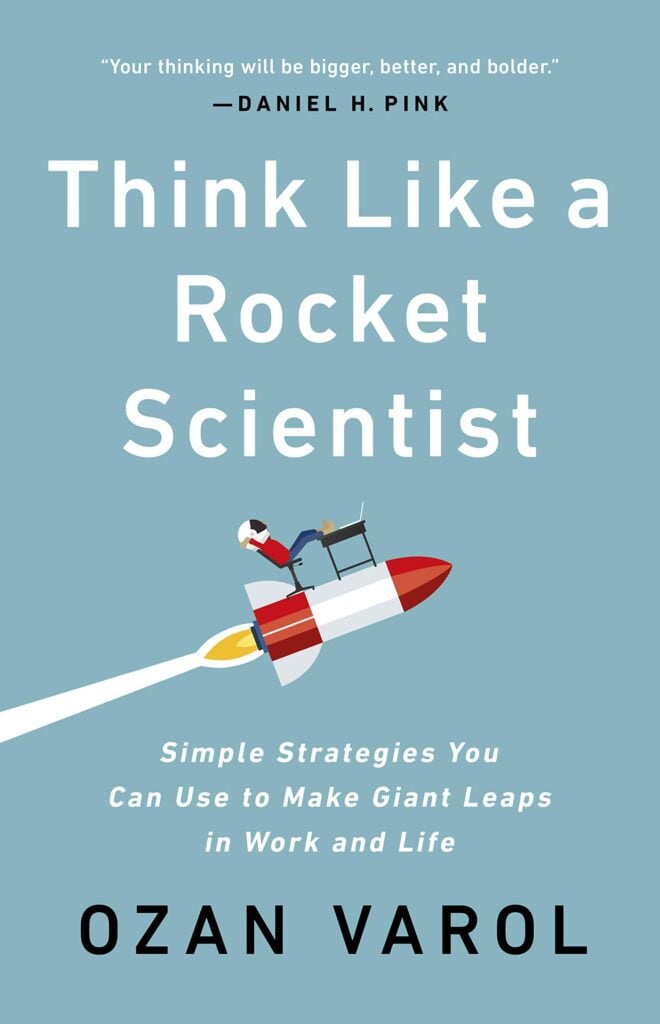How to Think Like a Rocket Scientist
Don’t let your passion and motivation keep you from thinking like a rocket scientist.
New entrepreneurs become enamored with their concept and assume the market exists, and customers will buy. They view their feature list as the solution and then define the problem as the absence of that solution. In reality, customers will only buy a solution to their problem. If you don’t solve their problem, you don’t have a product.
Passion and motivation have little to do with flawless execution. Until you demonstrate feasibility, both can quickly send you down the wrong road. Drowning yourself with information that supports your assumptions is easy, but it can blind you to reality.
In his book Think like a Rocket Scientist, Professor Ozan Varol, former rocket scientist turned award-winning law professor, discusses strategies from rocket science you can use in your personal life as well as in business.
We all encounter complex and unfamiliar problems in our lives. Those who can tackle these problems — without clear guidelines and with the clock ticking — enjoy an extraordinary advantage.
Professor Varol’s work has been featured in various domestic and foreign media, including the Wall Street Journal, Newsweek, BBC, TIME, CNN, and the Washington Post.
If you’re new to this, it’s a valuable eye-opener. I’ve summarised a shortlist of variables that new entrepreneurs too often overlook:
- Are you begin honest with yourself, or are you suffering from Confirmation Bias? If you’re emotionally invested in your solution, it will be hard to accept data and feedback that doesn’t support your conclusions. We all suffer from it to some degree. We tend to ignore information that doesn’t confirm our assumptions and rarely challenge our beliefs. We don’t ask hard questions when we’re afraid of what we might find.
- Critical thinking isn’t easy — passion and motivation, coupled with a false sense of own knowledge, all work against us. We might fear what we don’t fully understand, or gloss over it as though, in the grand scheme of things, it’s not a big deal. Most new entrepreneurs are hesitant to think big, don’t like to acknowledge uncertainty, and are afraid of failure. To succeed, you have to counteract each of these all the time. Trying to do this alone makes it even harder.
- Build your team early. Creativity, critical thinking, and problem-solving are better done with a collaborative team. “If I have seen further, it is by standing on the shoulders of giants,” said Sir Issac Newton. Your giants will be cofounders and advisors that bring a wide range of experience and perspectives to your program. Collectively, they will keep everyone accountable and moving forward. The right team will accelerate your program, lower your risk, and is the most significant factor in raising capital.
- Don’t get stuck in Convergent Thinking. If you’ve decided to build a company to deliver a cutting-edge solution, it doesn’t make much sense to stay anchored in convergent thinking. Convergent thinking focuses on what’s probable, doable, and easy. It relies on what has happened in the past. How many times has convergent thinking led to breakthroughs? If your team is more focused on shooting down ideas rather than generating game-changing solutions, you’ve created the wrong environment, or you’ve picked the wrong people — probably both.
- Stop Procrastinating. Stop and ask yourself what you’re avoiding. You’re often avoiding a critical task that you don’t know how to approach, or you’re afraid you might discover things that cause you to doubt your basic assumptions. Don’t confuse activity with progress. To be effective, prioritize those things that worry you the most. After confirming your product/market fit, execution should always top your list.
The challenge is to put your perceived expertise, passion, and motivation aside until you have a solid grasp of your product/market fit. No amount of passion and motivation will overcome a product that doesn’t serve a large enough market. Once you demonstrate that your market exists, allow your passion and motivation to help move you forward. Attack your challenges head-on. Create an environment that multiplies your team’s expertise.
Early in an engagement, I ask my clients to try and disprove their assumptions — this isn’t an easy process if done right. Go beyond the Devil’s Advocate approach — that’s too easy and a waste of time. If you already have an advisor on board, bring him or her into the process — you’ll capture additional confidence and a deeper understanding of your business model. Have this session before you spend time and money heading down the wrong path.

